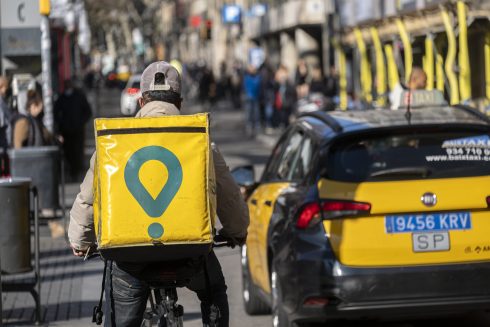THE Catalan CEO of embattled home delivery app Glovo has told a court the company’s ‘false self-employment model’ is fine and complies with Spain’s labour laws.
Oscar Pierre, the 31-year-old who co-founded the company in 2015, took to the stand in Barcelona to defend himself against charges of abusing his workers’ rights through a system which claimed drivers were ‘entrepreneurs’.
He spoke for only 15 minutes, taking questions only from his own lawyer and the public prosecutor before departing the courthouse without a word.
It is a model both the Labour Inspectorate and Prosecutor’s Office have slammed as ‘fraudulent’.

Today’s hearing came just a day after Glovo announced publicly that it was abandoning this model and giving full work contracts to its drivers.
Pierre denied that the move had any relation to his court appearance, according to El Pais, and claimed it was merely a coincidence that the Board of Directors took the decision the day before his court appearance.
The move followed years of intense legal pressure from Spanish authorities.
Around 60,000 delivery workers who have worked for Glovo since 2021 will now become regularly employed with all the benefits it brings, according to Labour Minister Yolanda Díaz.
The move follows repeated warnings and substantial fines from labor inspectors, who have long argued that Glovo was systematically exploiting workers by classifying them as independent contractors instead of employees.
READ MORE: How much does it cost to raise a child in Spain? Figure has surged by 13% since 2022
The ‘false self-employment’ model allowed Glovo to get away with not paying €267 million in Social Security contributions, a burden that instead fell on its own drivers.
Competitor Just Eat has already filed a lawsuit against Glovo, claiming the company gained an unfair competitive advantage by avoiding proper employment costs – estimated at over €645 million in savings.
Local riders’ rights group Riders X Derechos has responded with caution, highlighting Glovo’s ‘history of lawbreaking’ and calling for transparency in their employment practices.
READ MORE: EU upholds a fishing ban in Spain to protect mating dolphins: 300 boats will be affected
The Spanish government has already modified the Penal Code to enforce stricter penalties on companies misclassifying workers, with potential prison sentences of six months to six years.
This landmark decision isn’t just about Glovo. It signals a significant shift in how digital platform companies treat workers in Spain, potentially setting a precedent for similar businesses across Europe.
Díaz said: “A young person cycling with a mobile phone is not an entrepreneur. We have made rules to ensure this.”








